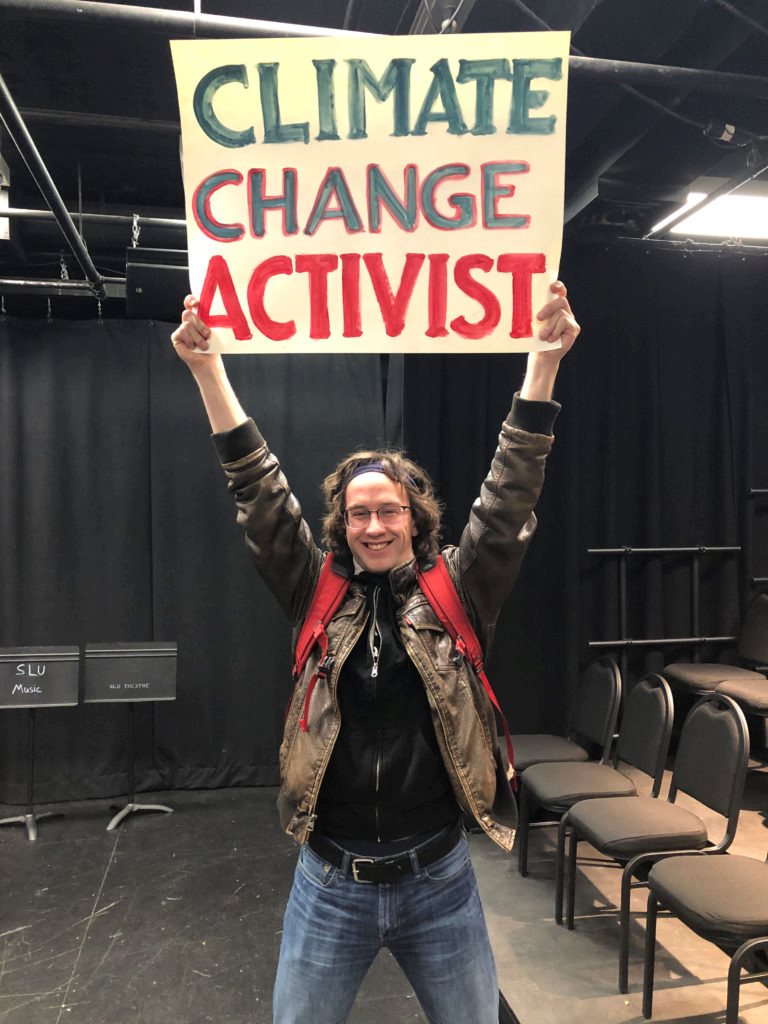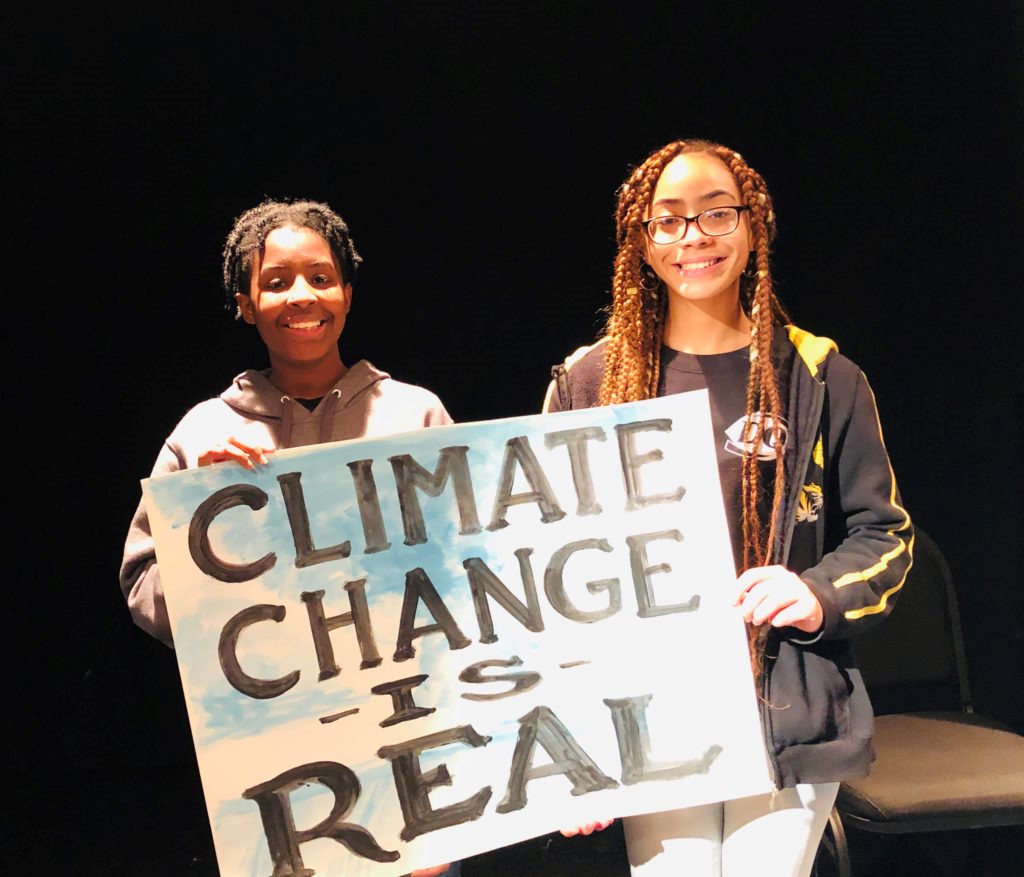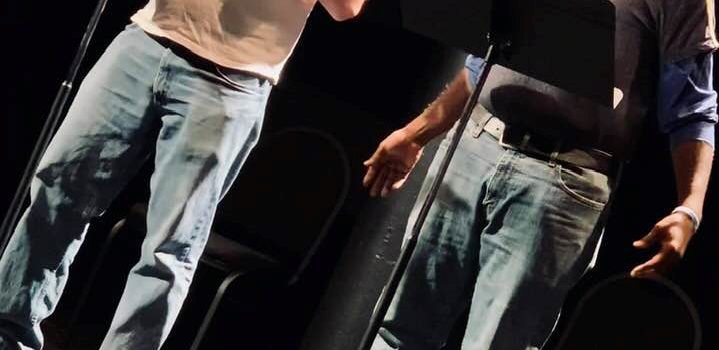On Dec. 13, 2019 at the Mark Wilson Theatre on the campus of St. Louis University, Playhouse Emissions: Climate Change Theatre Action St. Louis 2019 was presented as part of the international Climate Change Theatre Action 2019.
The
St. Louis event follows the growing tradition of rapid response from
theatre artists for collective action on some of the most pressing issues of
our time, including gun violence and extrajudicial violence against people of
color.

There is a growing movement within the global theatre community: a succession of artwork-cum-advocacy events, collections of short plays, crafted with an urgent deadline and for immediate performance, in an effort to address some of the most critical sociopolitical issues of our time. After an initial production, these play collections often circulate for years, becoming part of the theatrical and activist zeitgeist, and often a movement unto itself. Climate Change Theatre Action (CCTA) is one such movement.
CCTA is a worldwide series of readings and performances of short plays on climate change, primarily presented to coincide with the United Nations COP 25 meeting.
Produced by Joan Lipkin, and directed by Thomas Martin, Anna Blair, Alex Knapp, Playhouse Emissions featured a sampling of the CCTA international collection of short plays inspired by climate change and the science surrounding it. In 2019, close to 250 events were hosted in 25 countries, reaching an audience of 10,000 through live performance and an additional 10,000 via live streams and radio broadcasts.
“Climate change is one of the greatest challenges facing us as a global community,” said Joan Lipkin, Producing Artistic Director of That Uppity Theatre Company, and one of 2019’s commissioned playwrights. “Scientists estimate that we have 15 years to decarbonize the economy if we want to stave off the worst impacts of climate change that will affect all of us.”
The plays were selected from two anthologies that were commissioned by the CCTA organization. 50 playwrights were chosen from over 25 countries, from industrialized and developing countries and urban and rural areas. These perspectives include low-lying nations threatened by sea level change and countries facing severe heat waves, floods, droughts, deforestation and/or biodiversity collapse.
Lipkin and Knapp co-hosted the event, which featured performances from leading actors in St. Louis, including Dan Kelly, Michelle Dillard, Don McClendon, and Anna Blair, as well as students from St. Louis University and Washington University in St. Louis. The performance opened with a drum performance by World Vibrations, led by Lisa Frumhoff and concluded with a question and answer segment with David Brotherton, the Program Director for Business and the Environment at the University of California – Berkley.
Plays selected for Playhouse Emissions included Single Use by Marcia Johnson, Brackendale by Elaine Ávila, About That Chocolate Bar by Joan Lipkin, Six Polar Bears Fell from the Sky This Morning by Alister Emerson, El Toro Sagrado In the Car Repair Shop by Mindi Dickstein, and Homo Sapiens by Chantal Bilodeau.
“Among the short plays was a dramatic, interpretive reading of Greta Thunberg’s UN address on Climate Change. I was deeply moved by the re-enactment and inspired by how theatre arts keep the most compelling issues of our time alive,” said audience member Anne Taussig. Thunberg’s remarks were adapted by Lipkin and Knapp, a second-year master’s student in Theatre and Performance at Washington University in St. Louis, with music by Mitchell Manar. “The most important thing we can do is inform ourselves and understand the situation,” according to Greta Thunberg, the 16-year old climate activist.
“As a scholar and artist, I care deeply about education and access, especially regarding the most pressing concerns to life on this earth. I find performance to be an excellent venue for bringing these issues to the fore, sparking a dialogue within communities, and providing equitable access to education on these topics,” says Knapp.
“Saint Louis University is dedicated to providing the vehicle through which students and the general public can learn the facts about climate change using a variety of platforms including academics, public programs, and the arts. We are pleased to support this creative use of the arts in the service of both the humanities and climate change awareness,” said Dr. Jack Fishman, a Professor of Meteorology in the Department of Earth & Atmospheric Sciences and director of their Center for Environmental Sciences.
About Climate Change Theatre Action:
A collaboration between the Center for Sustainable Practice in the Arts, NoPassport Theatre Alliance, The Arctic Cycle, Theatre Without Borders, and York University, CCTA is a worldwide series of readings and performances of short climate change plays presented to coincide with the United Nations COP25.
Following the model pioneered by NoPassport, the organizers asked fifty writers from around the world to write short plays about an aspect of climate change. These plays were made available to producing collaborators who have presented over 100 events so far this season. Collaborators can choose as few or as many of the plays as they want.
Events range from readings in classrooms to fully staged performances and will take place in theatres, high schools, universities, eco-centers, community centers, on radio, and outdoors.

For the full list of events and participating playwrights:
www.climatechangetheatreaction.com
Events can also be followed via their Facebook Page.

Lynn (Zipfel) Venhaus has had a continuous byline in St. Louis metro region publications since 1978. She writes features and news for Belleville News-Democrat and contributes to St. Louis magazine and other publications.
She is a Rotten Tomatoes-approved film critic, currently reviews films for Webster-Kirkwood Times and KTRS Radio, covers entertainment for PopLifeSTL.com and co-hosts podcast PopLifeSTL.com…Presents.
She is a member of Critics Choice Association, where she serves on the women’s and marketing committees; Alliance of Women Film Journalists; and on the board of the St. Louis Film Critics Association. She is a founding and board member of the St. Louis Theater Circle.
She is retired from teaching journalism/media as an adjunct college instructor.

